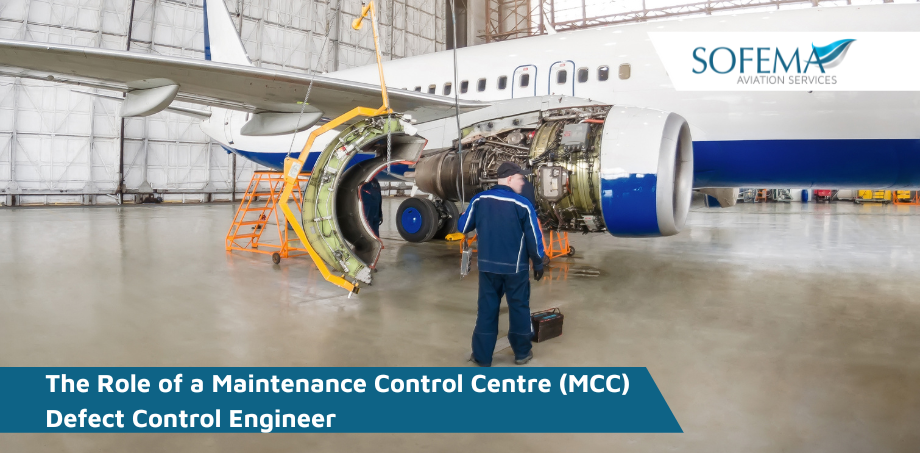Sofema Aviation Services (SAS) looks at the Roles & Responsibilities of a typical MCC Defect Control Engineer.
The Role of Defect Control Engineer is best suited to an established Certifying Staff with a Certificate of Release to Service (CRS) who typically will have 5 to 10 years of “hands-on experience” with excellent relevant knowledge of general IT competence and strong communication skills, proficient in English.
The Defect Engineer is typically responsible for Maximizing the operational availability of the aircraft, achieved through close monitoring and scheduling of all Maintenance Requirements and defect rectification.
Introduction – What Does an MCC Defect Control Engineer Do?
- Deputizes and assumes full responsibility for the Maintenance Control Centre (MCC) Duty Manager as required.
- In the event of an AOG, provides all necessary support & guidance to ensure the provision of any necessary spares and/or manpower.
- Ensures the continuous monitoring of A/C outstanding and recurring defects.
- Monitors the Aircraft Technical Log Books in particular related to the status of Deferred & Repetitive Defects.
- Attends the daily aircraft operation production meeting and reviews the operational / maintenance status of fleet aircraft and initiates necessary action in association with various other Dept.
- Acts as the Single Point of Contact to effectively oversee and manage MEL and Recurrent Defect required actions.
- Monitors all signals from Line Stations and takes appropriate action with regards to raised MEL / CDL deferred and critical acceptable deferred defects.
- Monitors online real-time aircraft fault reporting data systems (if available).
- In particular monitoring any defects which affect A/C operating performance or cause passenger inconvenience, ensuring a plan is formulated related to prompt rectification action.
- Manages all MEL-referenced defects to ensure timely rectification thereby minimizing applications for extending MEL deferral periods.
- Reviewing engine trend monitoring data for condition monitoring trends and liaise with engineering regarding matters of concern.
- Review component removals in conjunction with CAMO reliability Department to establish trend information.
- Takes specific action to support the timely rectification of outstanding defects.
- Initiates Engineering Requests (Engineering Orders) in respect of Maintenance Actions required following analysis.
- Performs a daily review to ensure the provision of parts and materials to support any recurrent & investigative future maintenance activities.
- Co-ordinate with CAMO Engineering / Development Engineering and / or the Original Equipment Manager (OEM), Type Certificate Holder (TCH) related to the issue of any required support documentation.
- Ensures A/C rotation and pre-positioning to ensure the availability of sufficient ground time to investigate and rectify any repetitive or outstanding defects.
- Provides Technical Guidance & Assistance as required to Aircraft Certifying Staff.
- Collates and distributes various reports and statistics as required by the Line & MCC.
- Provides Documentation support in particular related to:
o Aircraft Maintenance Manual (AMM);
o Component Maintenance Manual (CMM);
o Technical Follow up (TFU);
o Illustrated Parts Catalogue (IPC);
o Service Bulletins (SB’s) or Service Information;
o AMM, TSM, IPC references.
- The Defect Control Engineer often functions as interface between Engineering Maintenance and Flight Operation Dept.
- Ensuring the reporting and follow up of occurrence / incident / accident during aircraft operations / associated processes to Quality Manage.
Maintenance Control Centre Defect Engineer – Competencies
- Formal Aviation Training / AMEL.
- Practical experience and expertise in the application of aviation safety standards and safe operating practices.
- Good Knowledge of EASA Part CAMO, Part M & Part 145 Regulations.
- Understanding of all Organizational Quality Procedures.
- Familiar with human factor principles and SMS.
- Knowledge of Aircraft and associated maintenance.
- Knowledge of maintenance planning and scheduling.
- Knowledge of maintenance management software (as appropriate).
Next Steps
Follow this link to our Library to find & Download related support documents.
Note – Sofema Aviation Services offers the following training in support of the understanding of all elements required to develop either an MCC Heavy or Light function:
For additional questions or to register please email team@sassofia.com
Tags:
Aircraft Maintenance Manual (AMM), aviation, Aviation MCC, CAMO, Certificate of Release to Service (CRS), Component Maintenance Manual (CMM), DCE, Defect Control Engineer, EASA, EASA regulations, Maintenance Control Centre (MCC), Minimum Equipment List (MEL), Online Training, Original Equipment Manager, SAS blogs




